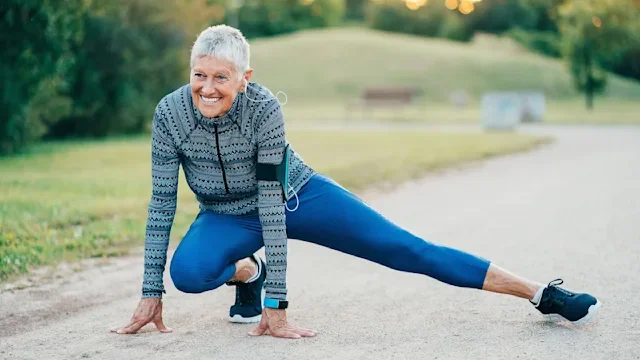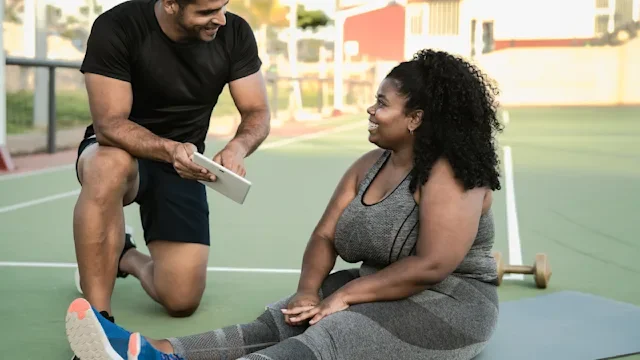Key takeaways:
When you work out too soon after eating, it may cause gastrointestinal (stomach) issues that affect your workout.
General guidelines suggest exercising 1 to 2 hours after a small meal and 30 to 60 minutes after a snack to fuel your workout and prevent stomach problems.
But the best time to exercise after eating varies based on exercise intensity, what you eat, and other factors.
Proper nutrition is a crucial factor in any exercise program. Your body needs calories to fuel your workouts. Without it, your performance and recovery can suffer. What you eat might be just as important as when you eat. But getting the right mix of nutrients at the right time might be confusing.
You want to have enough energy for a good workout. But you don't want a pre-workout meal to cause sluggishness or an upset stomach. So, how long should you wait to work out after eating? The research can help you decide.
How long should you wait to exercise after eating?
There isn’t a one-size-fits-all answer to this question. That’s because it depends on several factors. For example, one study found that women digest food more slowly than men. And, as you age, your digestion slows, which might mean you need to wait longer between eating and working out. Additionally, if you have a gastrointestinal disorder, like irritable bowel syndrome (IBS), you may digest foods faster or slower than others.
Search and compare options
There are so many variables, because digestion is a complex process. It involves breaking down macronutrients — carbs, fats, and proteins — into smaller parts. Your body absorbs those small parts and uses them for energy, growth, and cell repair.
The process, including the amount of time it takes, is different for each of those macronutrients. Experts estimate that it can take up to 73 hours for complete digestion.
Based on that estimate and research, here are some guidelines:
After a large meal: Wait 3 to 4 hours before exercise.
After a small meal: Wait 1 to 2 hours before exercise.
After a light snack: Wait 30 minutes to 1 hour before exercise.
Remember, these are very general suggestions. So, listen to your body, and time your workouts accordingly.
Is it better to eat before or after a workout? Both can help. Here’s what you need to know about eating before and after exercise.
A snack before exercise can boost your performance. Try one of these pre-workout snacks to give you energy.
Post-exercise nutrition can help you recover after workouts. Consider these foods for muscle recovery.
What factors affect how long you should wait to work out after eating?
To a certain extent, meal and exercise timing is a personal preference. It can depend on key factors, including:
What you eat: Certain foods –– including those high in fat, protein, and fiber –– take longer to digest. So what you eat can help determine how long you should wait to start exercising.
How much you eat: Meal size also affects your wait time before a workout. The more you eat, the longer it takes to digest. So you might have to wait longer to start your training if you eat a full meal instead of a snack.
Exercise type: When you exercise, more blood flows to your working muscles to support movement. This shift reduces blood flow to your gut, which may disrupt the digestive process. And research indicates that high-intensity exercise may be more likely to cause gastrointestinal problems such as runner's stomach.
Individual physiology: Everyone’s digestive system is different. Your age, gender, pre-existing health conditions, and other factors can influence how quickly your body digests food. They can also affect how sensitive your body is to activity during the digestive process.
Read more like this
Explore these related articles, suggested for readers like you.
What can happen if I eat right before my workout?
If you eat right before a workout, it may cause gastrointestinal problems. Potential side effects vary from person to person. But they may include:
Acid reflux
Heartburn
Vomiting
Stomach cramping
Bloating
Diarrhea
You might also experience low energy or sluggishness that affects your workout performance. Scientists are still trying to understand what causes this post-meal fatigue, sometimes called a food coma. One theory is that blood flow is redirected from the brain to the digestive organs after a meal. Other theories suggest that eating triggers the release of hormones or small proteins that cause fatigue.
Blood sugar fluctuations may also explain a post-meal energy dip. That’s especially the case if you eat a lot of refined carbohydrates — like white bread or pasta — or sugary foods. These foods can cause a sharp rise in blood sugar, followed by a sharp decline, which can leave you feeling wiped out.
What’s a good meal or snack to eat before exercising?
Pre-workout nutrition depends on how your body digests various foods and how long and how intense your workout is. That being said, proper nutrition can help fuel your workout and improve your performance and recovery.
If you eat 3 to 4 hours before a moderate-intensity, hour-long workout, you should plan a balanced meal. Generally, this includes a mix of:
Complex carbohydrates: Complex carbohydrates –– like whole grains, beans, and vegetables –– provide energy to power your workouts. But they may take longer to digest. That makes them a better option hours before you exercise.
Protein: Protein is important for muscle growth and recovery. You can find protein in lean meats, fish, dairy, beans, and other sources.
Healthy fats: Healthy fats –– like those found in nuts, seeds, and fish –– are essential for a balanced diet. Like complex carbs, they take longer to digest and are a better meal option hours before a workout.
If you exercise more than 4 hours after your last meal, grab a light snack 30 to 60 minutes before your workout. A combination of carbs and protein may boost your endurance and training performance. Try snacks that contain carbs and a little protein. Some examples include:
Apple slices with peanut butter
Greek yogurt with berries
Hummus and pita bread
And if your workout is longer than 60 minutes at a moderate or high intensity, it may help to have extra carbs on hand. Experts recommend replenishing your carbs on an hourly basis throughout your workout. In these cases, opt for easy-to-digest carbs, such as:
Toast with peanut butter
Half a banana with almond butter
An energy bar
Energy gels are a great way to take your carbs with you on long workouts. Some gels contain sugar alcohols, which may cause digestive distress. So be sure you test them to avoid any surprises. And don’t forget to drink water for proper hydration before, during, and after your workout.
What foods should you avoid before exercising?
When you grab a pre-workout snack, keep in mind that fiber-rich, high-protein, and fatty foods take longer to digest. Limiting sugary foods is a good idea, especially if you want to maintain consistent energy levels.
You can also adjust your pre-workout diet based on what you know about your digestive system. If you tend to get acid reflux or heartburn during exercise, you should avoid foods and beverages that make your symptoms worse. These include:
Citrus fruits
Spicy foods
Fatty foods
Chocolate
Caffeine
Alcohol
If your symptoms are gas and bloating, avoiding these foods before exercise might help:
Sugar alcohols, which may be in some energy bars and sugar-free foods like cookies, cake, and candy
Certain vegetables, such as broccoli, asparagus, and cabbage
Beans and lentils
Grains, like wheat and rice
Carbonated beverages
Dairy products
Understanding what foods you should avoid before exercise may take trial and error. Keep track of how you feel during your workouts after eating certain foods. If something doesn’t agree with you, make sure you don’t eat it too close to an exercise session.
The bottom line
Eating too close to your workout can cause gastrointestinal issues that slow you down. Some research suggests that waiting 1 to 2 hours after a small meal and 30 to 60 minutes after a snack may help you avoid stomach problems. But several factors –– including exercise intensity and what you eat –– can help you decide the best time to exercise after eating.

Why trust our experts?



References
Bazar, K. A., et al. (2004). Debunking a myth: Neurohormonal and vagal modulation of sleep centers, not redistribution of blood flow, may account for postprandial somnolence. Medical Hypotheses.
Beck, K. L., et al. (2015). Role of nutrition in performance enhancement and postexercise recovery. Open Access Journal of Sports Medicine.
Breymeyer, K. L., et al. (2017). Subjective mood and energy levels of healthy weight and overweight/obese healthy adults on high-and low-glycemic load experimental diets. Appetite.
Clark, A., et al. (2016). Exercise-induced stress behavior, gut-microbiota-brain axis and diet: A systematic review for athletes. Journal of the International Society of Sports Nutrition.
Close, G. L., et al. (2016). New strategies in sport nutrition to increase exercise performance. Free Radical Biology and Medicine.
De Oliveira, E. P., et al. (2009). The impact of physical exercise on the gastrointestinal tract. Current Opinion in Clinical Nutrition and Metabolic Care.
De Oliveira, E. P., et al. (2014). Gastrointestinal complaints during exercise: Prevalence, etiology, and nutritional recommendations. Sports Medicine.
Harthoorn, L. F., et al. (2007). Periprandial changes of the sympathetic–parasympathetic balance related to perceived satiety in humans. European Journal of Applied Physiology.
Joyner, M. J., et al. (2015). Regulation of increased blood flow (hyperemia) to muscles during exercise: A hierarchy of competing physiological needs. Physiological Reviews.
Kersick, C., et al. (2017). International Society of Sports Nutrition position stand: Nutrient timing. Journal of the International Society of Sports Nutrition.
Lee, Y. Y., et al. (2014). How to assess regional and whole gut transit time with wireless motility capsule. The Journal of Neurogastroenterology and Motility.
Lershkov, L. L., et al. (2018). The role of IL-1 in postprandial fatigue. Molecular Metabolism.
Makinen, K. K., et al. (2016). Gastrointestinal disturbances associated with the consumption of sugar alcohols with special consideration of Xylitol: Scientific review and instructions for dentists and other health-care professionals. International Journal of Dentistry.
National Institute of Diabetes and Digestive and Kidney Diseases. (2017). Your digestive system and how it works.
Nielsen, L. L. K., et al. (2020). The effect of ingesting carbohydrate and proteins on athletic performance: A systematic review and meta-analysis of randomized controlled trials. Nutrients.
Remond, D., et al. (2015). Understanding the gastrointestinal tract of the elderly to develop dietary solutions that prevent malnutrition. Oncotarget.
Rothschild, J. A., et al. (2020). What should I eat before exercise? Pre-exercise nutrition and the response to endurance exercise: Current prospective and future directions. Nutrients.
Sensoy, I. (2021). A review on the food digestion in the digestive tract and the used in vitro models. Current Research in Food Science.
University Hospitals. (n.d.). The digestive process: How is food digested in the stomach?
University of Rochester Medical Center. (n.d.). Gastroesophageal reflux disease (GERD)/heartburn.
Vasavid, P., et al. (2014). Normal solid gastric emptying values measured by scintigraphy using Asian-style meal: A multicenter study in healthy volunteers. The Journal of Neurogastroenterology and Motility.


















